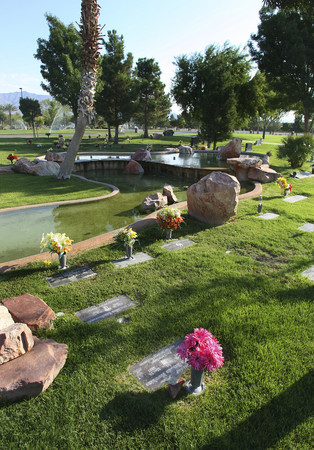Cremation growing choice of Nevadans concerned about cost, environment
Nevada, a state known for grabbing and holding firm to the bottom spot on most national lists, ranks first in the nation in the percentage of cremations.
In 2007, cremation was the chosen method of disposition in 66.7 percent of all deaths, according to the most recent statistics from the Cremation Association of North America, says the organization's director, John Ross.
It appears to be a western thing, as the top seven states on the cremation list are all in the West.
Oregon ranks second followed by Washington, Hawaii, Arizona, Colorado and Montana.
There are two factors at play, Ross says: transient populations and an awareness of environmental issues.
Another reason for the increase in Nevada could be attributed to the economy. Cremation costs less than a traditional burial, Ross notes. In 2006, Nevada's rate of cremation was 60 percent. Within a year, it increased almost 7 percentage points, coinciding with the recession.
"In 2007, people were starting to feel the economic impact and there was more cost consciousness," Ross says. "In some cases, cremation can cost two-thirds less than a traditional burial."
A burial can cost about $5,000, which includes casket, burial and service. There are additional costs for transporting bodies for burial out of state, too. Cremation costs about $1,700, which includes the cremation itself, a memorial service and other necessities.
It's difficult to pinpoint an exact reason for the growing popularity of cremation in Nevada, says Ned Phillips, vice president of community relations for Palm Mortuary.
"There's no real concrete answer," Phillips says. "It's been my experience in dealing with families that cremation has become a preference for them."
There are cultural preferences, of course. Some religions, such as Hindu and Buddhism, prefer cremation. The Catholic Church forbade it until 1963, Ross notes. It is not usually an option in Islamic or Jewish traditions.
A traditional burial consumes a lot of energy and leaves a large ecological footprint. It requires land for burial as well as materials, Ross says.
In Las Vegas, people consider cremation more ecological as well as economical, Phillips says. Often, though, families who want to cremate a deceased loved one haven't considered what to do afterward.
"When people make that decision they don't realize they still have to decide what to do with the cremated remains," Phillips says. "That's why I think it's important to make a decision on final disposition" before death.
There are a variety of options for cremated remains, including keeping them; scattering the ashes; burying them; or placing them in a columbarium, a repository for human ashes.
Some states have strict limitations on the scattering of ashes. Nevada law allows scattering of ashes on private property but only with the property owner's permission. That means you can't scatter ashes from the top of Bellagio's parking garage, at Mount Charleston or Red Rock Canyon National Conservation Area unless those property owners give permission.
Ashes also can be scattered by air, over a public waterway, at sea or at a cemetery for such purposes. Palm and other local mortuaries have scattering gardens, an area where loved ones can scatter ashes, Phillips says.
Mortuaries usually can make arrangements for requests to scatter ashes at sea or other locations, he adds.
Sometimes, a funeral home will tell a family that a casket is required for cremation, Ross says. That isn't always the case.
In Nevada, a funeral home won't handle a body in an undignified manner so most will require some kind of container, Phillips says. Palm Mortuary's minimum container, which costs $25, is basically made of a sturdy cardboard.
The Federal Trade Commission regulates funeral homes and requires them to provide a price sheet. It's a good law that protects the consumer, Phillips says. The sheet should list prices for every service provided by the funeral home.
Contact reporter Sonya Padgett at spadgett@reviewjournal.com or 702-380-4564.
Indigent burials
Benjamin Franklin once said death and taxes were the only certainties in life.
He forgot paying for death. No matter who you are or where you die in this country, someone must pay for your method of disposition, whether it's family, friends or prearrangements made by you.
In some cases, it's taxpayers.
Indigent burials have long been a function of government agencies, and the numbers are increasing in Clark County. From fiscal year 2008 to 2009, the number of indigent burials and cremations increased from 741 to 904, or 22 percent, says county spokesman Dan Kulin.
And because it is so much cheaper than a traditional burial, all indigent deaths are cremated unless religious beliefs prohibit it.
A cremation costs the county $425 while a burial costs $1,827, Kulin says.
During the fiscal year of 2008-2009, the county handled 41 burials and 863 cremations. The previous year, from 2007-2008, the county handled 29 burials and 712 cremations.
SONYA PADGETT



















